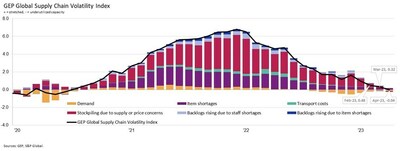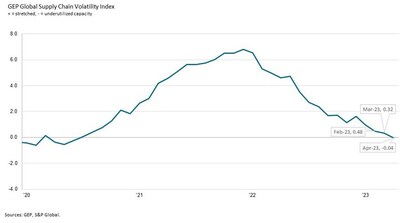|
15.05.2023 17:26:00
|
GLOBAL SUPPLY CHAINS NOW HAVE SPARE CAPACITY FOR THE FIRST TIME SINCE JUNE 2020 AS 10 MONTHS OF SUBDUED DEMAND, INVENTORY DE-STOCKING AND HIGH INTEREST RATES BITE: GEP GLOBAL SUPPLY CHAIN VOLATILI...
- Although global demand remains subdued, there has been an uptick since December's trough, while the trend actually improved slightly in North America in April, indicating some economic resilience
- Excess supply chain capacity was also driven by global organizations' drawdown of their safety stocks, which have fallen below their historic average for the first time in three years
- Supply chain pressures in Asia ease as the economic rebound from China's reopening peters outs
CLARK, N.J., May 15, 2023 /PRNewswire/ -- The GEP Global Supply Chain Volatility Index — a leading indicator tracking demand conditions, shortages, transportation costs, inventories and backlogs — shows that for the first time since June 2020, global supply chain capacity is now underutilized, indicating a shift to a buyers' market.
Following inventory drawdowns (which are still ongoing) and 10 months of depressed global demand, the GEP Global Supply Chain Volatility Index fell below zero in April to -0.04, from 0.32 in March, a striking contrast from the picture a year ago when GEP's index stood at 4.61, one of the highest levels of volatility in the 20 years of data.
While global demand for raw materials, commodities and components remains subdued, it is much improved from the trough in December 2022, indicating some stability in the face of consistently high interest rates and a global manufacturing sector under intense pressure.
Lower global input demand is in large part due to companies' drawdown of their inventories and safety stocks. Reports of stockpiling items due to price or supply fears are now running below historic norms, indicating that firms' concerns toward inflation and supplier delivery times have alleviated.
Commenting on the April data, Volker Roelofsen, vice president, supply chain consulting, GEP, said: "After months of companies aggressively destocking, there is now excess capacity in the world's supply chains, providing buyers with greater leverage to extract favourable prices and terms for the second half of 2023 and into 2024. The good news is that companies' demand for components and raw materials, while subdued, is holding steady, indicating that central banks are, at least for now, successfully engineering a measured slowdown."
The key findings from April's data:
- DEMAND: Global demand for raw materials, commodities and components continues to be subdued, especially in Europe. In North America, the trend is improving despite high interest rates.
- INVENTORIES: Inventories fall as companies continue to address overstocked warehouses. Reports of safety stockpiling are below their historic average for the first time since the start of the pandemic in 2020.
- MATERIAL SHORTAGES: Business reports of item shortages are at their lowest since September 2020. Shortages were particularly low for metals and chemicals, although poor availability is still ongoing for semiconductors and electrical items.
- LABOR SHORTAGES: As has been the case since the start of 2023, labor shortages are having little adverse effect on suppliers, indicating current staffing is adequate to cope with demand.
- TRANSPORTATION: Global transportation costs remain stable and anchored around historically normal levels, reflecting efficiently operating supply chains as pressures on freight have subsided.
- REGIONAL SUPPLY CHAIN VOLATILITY: Global supply chain volatility is falling in Europe and North America. Suppliers feeding in Asia are under the least amount of strain since August 2020 because of China's fully reopened economy.
For more information, visit www.gep.com/volatility
Note: Full historic data dating back to January 2005 is available for subscription. Please contact economics@spglobal.com.
ABOUT THE GEP GLOBAL SUPPLY CHAIN VOLATILITY INDEX
The GEP Global Supply Chain Volatility Index is produced by S&P Global and GEP. It is derived from S&P Global's PMI™ surveys, sent to companies in over 40 countries, totaling around 27,000 companies. The headline figure is a weighted sum of six sub-indices derived from PMI data, PMI Comments Trackers and PMI Commodity Price & Supply Indicators compiled by S&P Global.
- A value above 0 indicates that supply chain capacity is being stretched and supply chain volatility is increasing. The further above 0, the greater the extent to which capacity is being stretched.
- A value below 0 indicates that supply chain capacity is being underutilized, reducing supply chain volatility. The further below 0, the greater the extent to which capacity is being underutilized.
A Supply Chain Volatility Index is also published at a regional level for Europe, Asia, North America and the U.K. For more information about the methodology, click here.
About GEP
GEP® delivers transformative supply chain solutions that help global enterprises become more agile and resilient, operate more efficiently and effectively, gain competitive advantage, boost profitability and increase shareholder value. Fresh thinking, innovative products, unrivaled domain expertise, smart, passionate people — this is how GEP SOFTWARE™, GEP STRATEGY™ and GEP MANAGED SERVICES™ together deliver supply chain solutions of unprecedented scale, power and effectiveness. Our customers are the world's best companies, including more than 550 Fortune 500 and Global 2000 industry leaders who rely on GEP to meet ambitious strategic, financial and operational goals. A leader in multiple Gartner Magic Quadrants, GEP's cloud-native software and digital business platforms consistently win awards and recognition from industry analysts, research firms and media outlets, including Gartner, Forrester, IDC, ISG, and Spend Matters. GEP is also regularly ranked a top supply chain consulting and strategy firm, and a leading managed services provider by ALM, Everest Group, NelsonHall, IDC, ISG and HFS, among others. Headquartered in Clark, New Jersey, GEP has offices and operations centers across Europe, Asia, Africa and the Americas. To learn more, visit www.gep.com.
About S&P Global
S&P Global (NYSE: SPGI) S&P Global provides essential intelligence. We enable governments, businesses and individuals with the right data, expertise and connected technology so that they can make decisions with conviction. From helping our customers assess new investments to guiding them through ESG and energy transition across supply chains, we unlock new opportunities, solve challenges and accelerate progress for the world. We are widely sought after by many of the world's leading organizations to provide credit ratings, benchmarks, analytics and workflow solutions in the global capital, commodity and automotive markets. With every one of our offerings, we help the world's leading organizations plan for tomorrow, today.
Disclaimer
The intellectual property rights to the data provided herein are owned by or licensed to S&P Global and/or its affiliates. Any unauthorised use, including but not limited to copying, distributing, transmitting or otherwise of any data appearing is not permitted without S&P Global's prior consent. S&P Global shall not have any liability, duty or obligation for or relating to the content or information ("data") contained herein, any errors, inaccuracies, omissions or delays in the data, or for any actions taken in reliance thereon. In no event shall S&P Global be liable for any special, incidental, or consequential damages, arising out of the use of the data. Purchasing Managers' Index™ and PMI™ are either registered trademarks of Markit Economics Limited or licensed to Markit Economics Limited and/or its affiliates.
This Content was published by S&P Global Market Intelligence and not by S&P Global Ratings, which is a separately managed division of S&P Global. Reproduction of any information, data or material, including ratings ("Content") in any form is prohibited except with the prior written permission of the relevant party. Such party, its affiliates and suppliers ("Content Providers") do not guarantee the accuracy, adequacy, completeness, timeliness or availability of any Content and are not responsible for any errors or omissions (negligent or otherwise), regardless of the cause, or for the results obtained from the use of such Content. In no event shall Content Providers be liable for any damages, costs, expenses, legal fees, or losses (including lost income or lost profit and opportunity costs) in connection with any use of the Content.
Media Contact | |
Derek Creevey | Joe Hayes |
Director, Public Relations | Senior Economist |
GEP | S&P Global Market Intelligence |
Phone: +1 732-382-6565 | T: +44-1344-328-099 |
Email: derek.creevey@gep.com | joe.hayes@spglobal.com |
![]() View original content to download multimedia:https://www.prnewswire.com/news-releases/global-supply-chains-now-have-spare-capacity-for-the-first-time-since-june-2020-as-10-months-of-subdued-demand-inventory-de-stocking-and-high-interest-rates-bite-gep-global-supply-chain-volatility-index-301824803.html
View original content to download multimedia:https://www.prnewswire.com/news-releases/global-supply-chains-now-have-spare-capacity-for-the-first-time-since-june-2020-as-10-months-of-subdued-demand-inventory-de-stocking-and-high-interest-rates-bite-gep-global-supply-chain-volatility-index-301824803.html
SOURCE GEP
 Der finanzen.at Ratgeber für Aktien!
Der finanzen.at Ratgeber für Aktien!
Wenn Sie mehr über das Thema Aktien erfahren wollen, finden Sie in unserem Ratgeber viele interessante Artikel dazu!
Jetzt informieren!
Nachrichten zu S&P Global Incmehr Nachrichten
Analysen zu S&P Global Incmehr Analysen
Aktien in diesem Artikel
| S&P Global Inc | 490,05 | -0,34% |
|


